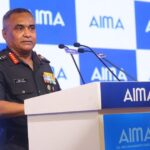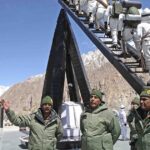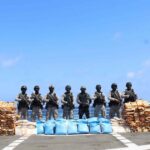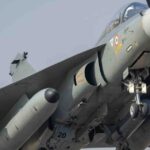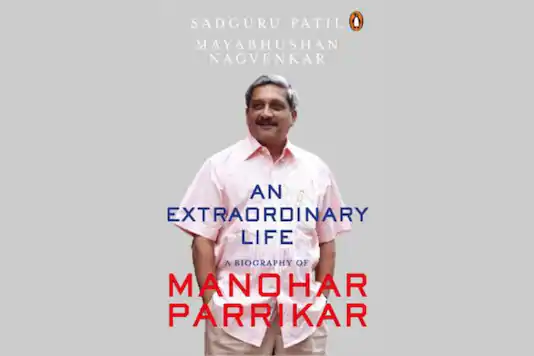
SOURCE: NEWS18
In the biography of former defence minister and Goa’s chief minister late Manohar Parrikar, authors’ Sadguru Patil and Mayabhushan outline with meticulous detail how the surgical strikes were planned in retaliation to the 2016 militant attack at an Army base in Uri, Jammu and Kashmir.
The book, titled An Extraordinary life: a biography of Manohar Parrikar that was launched on Friday recounts Parrikar’s second-last public appearance before his death due to pancreatic cancer. During the appearance, he was so unwell that he had to be wheelchaired out and lifted onto the stage erected at the newly constructed signature bridge across the Mandovi river, which he was inaugurating.
During that appearance, Parrikar, labouring through pipes in his nose and other medical paraphernalia hanging from below his shirt, had famously opened his speech with the line ‘How’s the josh!’ to the thousands who had assembled at the bridge to catch a glimpse of their ailing chief minister.
The phrase, ‘How’s the Josh?’, from the Hindi film, Uri: The Surgical Strike, starring Vicky Kausal, had by then become a popular dialogue.
Although Parrikar wanted to see the film, he could not do so due to his failing health. However, of all people, he might have known more about the surgical strikes following the attack in Uri than the makers of the film themselves, given that he was the one who supervised the strikes as the defence minister of the time.
The book describes how tensions brewing across the border finally resulted into the strikes. It states:
The build-up to the moment on 29 September, which virtually defined Prime Minister Narendra Modi’s masculine military doctrine and philosophy of hot pursuit, goes back to another surgical strike carried out by India’s elite 21 Para commandos, along with the Indian Air Force, on camps of Nationalist Socialist Council of Nagaland-Khaplang and Kanglei Yawol Kanna Lup, a Manipuri extremist group. The strike on 9 June on Myanmar soil, which led to the neutralization of dozens of militants (there is no official count) on 10 June 2015, followed a NSCN-K ambush on 4 June on an Indian Army convoy carrying 6 Dogra Regiment soldiers, in which eighteen men in uniform were killed.
Parrikar was in Pune and was scheduled to leave for Vizag for a wedding along with Utpal (his son) when he got a call that requested his presence in Delhi immediately. ‘Bhai just said hanka paylichan tough uttar divpak jay [We have to be tougher in our response than before],’ recalls Utpal. The Vizag plan was shelved and Parrikar left for Delhi.
Two days later, when Utpal was at his factory in Goa, his father called him and asked him to watch the 21 Para’s exploits on TV. The 21 Para blitz was trumpeted by the National Democratic Alliance as a sign of a resurgent and courageous India, whose armed forces did not pussyfoot when it came to dancing across the border to reap revenge and then hopping back after a day’s work. It was amid these boisterous moments in India that a question posed by a mediaperson to then Union Minister of State for Information and Broadcasting and a soldier himself Rajyavardhan Rathore, got Parrikar’s goat.
‘But one question hurt me. Col. Rajyavardhan Singh Rathore, being an ex-army man, was explaining about such operations and one of the news anchors asked him: “Would you have the courage and capability of doing the same on the western front?”’ Parrikar said at an event in Goa in July 2017, months after he was sworn in as the chief minister once again.
‘After a successful surgical strike, this was another insult to me, which I listened to very intensely but decided to answer when the time came. We started preparations for the 29 September [2016] surgical strike on 9 June, exactly fifteen months prior to the event. We started planning for any eventuality at least fifteen months in advance,’ he also said. Parrikar’s ire was evident after the attack on the army base in Uri, according to then Union Home Minister Rajnath Singh.
‘After the Uri terror attack, we were called by PM. I was with Parrikar in that meeting. Parrikar was extremely upset and angry over the incident,’ Singh told a condolence meeting in Panaji following Parrikar’s death in March 2019. Parrikar was in fact in Goa, when the fidayeens launched their attack on the army base and rushed back to Delhi on learning of the Uri attack.
As the Indian state plotted its revenge, intelligence chiefs, the national security advisor (NSA), top military and political leadership got into a series of huddles in the defence ministry’s out-of-bounds ‘war room’ in the maze of South Block. Waiting outside the premises, Parrikar’s OSD Joshi did not have a clue about history being written within the close sound-proofed doors.
‘Normally, I used to sit outside during meetings, especially with the PM. So we would get to know something or the other about what was going on. But during the post-Uri surgical strikes, there were meetings in the war room. Rajnath Singh, NSA Ajit Doval, Parrikar used to meet with armed forces’ chiefs. I would wait outside. I would wonder about the nature of the conversations sometimes. There were many pre-preparation meetings, but nothing would leak,’ he says.
Parrikar, according to Joshi, did not sleep a wink when the elite soldiers were dispatched on the mission across the Line of Control. All his staffers knew, was that Parrikar was waiting for a phone call. According to Milind Karmarkar, a Sangh volunteer and a close friend of Parrikar, the defence minister, was desperate to speak to someone that night, as commandos were on their cross-border stealth mission.
‘Manohar told me that he was desperately in need of a friend he could speak to that night. He wanted to ease the tension, which was developing as his team closely monitored the progress of the strike,’ Karmarkar tells the authors. Karmarkar also says that one journalist who was known to be close to Parrikar, kept calling him to ask if he could come over that night. ‘He [Manohar] told me that the journalist could not have known about the surgical strike. But he called Manohar thrice. Manohar even told me that if the mediaperson had called just once more, he would have invited the journalist over. He just wanted a friend to chat with so he did not doze off during such a critical night,’ Karmarkar says.
The book goes on to describe, that despite his inkling, Parrikar kept the news of the secret mission, close to his vest. However, after he learnt that the mission was successful and Indian commandos have returned, Parrikar desperately tried reaching Utpal, who was on a business visit to Japan at the time. The book states, “He could not get through despite several calls, but when he did, his first two words to his son were: ‘Pakistanak udaylo’ (Pakistan has been knocked off).”
Parrikar was a Goan at heart, and the loneliness he experienced in Delhi and its cruel weather and pollution had only increased his longings for his home state. Of course, there were political reasons too, and there was also the lure of staying with his family and friends again. However, the book states, that he would often call his stint as the defence minister as a ‘debt Goa had to pay to the armed forces.’ The book states:
…he would often raise the emotional, patriotic pitch with his trademark refrain that he returned to his home state after paying a debt to the Indian Armed Forces—by serving as the defence minister—which liberated Goa from Portuguese rule in 1961.
‘So I have done my duty for the nation. Probably that was a loan Goa owed, which needed to be paid back. The Indian Army liberated the state. I think that was a debt that needed to be paid back,’ he said during an interactive session on the occasion of Information Technology Day in 2018.
After 451 years of Portuguese colonial rule, the Indian Armed Forces through military action liberated the coastal state, along with other Portuguese-held territories of Diu and Daman. Years before he became the defence minister, Parrikar had been less flattering while describing the Indian Armed Forces. In 2012, as the Goa CM, he had famously said in the state legislative assembly, ‘It is easier to get the army to vacate from Lahore but not from even an inch of land in Panaji […].’
The Indian Armed Forces, especially the army and the navy hold large tracts of land in prime areas in Goa, which repeated state governments have tried to urge them to give up and relocate to less populous areas within the state. As the defence minister, Parrikar, despite his repeated promises, failed to wrest the same tracts of land in Goa from the Indian Armed Forces, proving perhaps that defence ministers come and go, but the military stays put.
The following excerpt has been published with permission from Penguin Publishers. An Extraordinary life: a biography of Manohar Parrikar, written by Sadguru Patil and Mayabhushan is priced at 599 (hardback).

